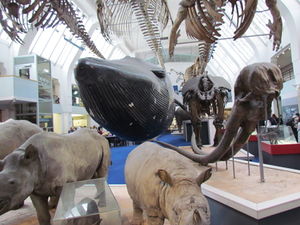Cultural tourism
| Cultural tourism |
|---|
| See also |
Cultural tourism is very complex concept and one of the most popular form of tourism. It concerns all visitors travelling to experience culture. As culture contains tangible and intangible elements - cultural tourism is focused on experience all of them by travelling to chosen locations. One of the most popular definition of cultural tourism is travelling from permanent place of stay to cultural attractions to gain knowledge, experience and to satisfy their wants.
This type of tourism is strongly connected with urban tourism as many heritage sites, events, folklore and beliefs emerged in the past and present within the cities. The growth of visiting cultural sites is an effect of culturisation of society and emerging trends to experience places not only visit and see. People seek something new, unusual for them and tourism allows them to obtain knowledge about world outside their homes.
WTO provides other definition in which cultural tourism is any movements of people for including performing arts, cultural tours, travel to cultural events, visiting sites, monuments, travel to study nature, folklore or art or pilgrimages.
Main activities of cultural tourism
Activities counted as part of cultural tourism:
- attending cultural events,
- visiting museums, art galleries, archaeological sites,
- visiting historical locations,
- visiting cities and places connected with lives of famous artists,
- taking part in different workshops connected with local culture,
Sources of cultural tourism growth
- transport development
- culturisation of society
- technological progress
- evolving tourists’ needs (e.g. focus on experience, authenticity)
Role of cultural tourism
Cultural tourism is nowadays viewed as important factor for tourism growth. Many tourism destinations focus on create cultural offer that will attract new type of tourists. Cultural tourism allows people to differ their own culture from others and build more tolerance for them.
See also::
References
- McKercher, B., Cros, H. D., & McKercher, R. B. (2002). Cultural tourism: the partnership between tourism and cultural heritage management. Haworth Hospitality Press.
- Richards, G. (1996). Production and consumption of European cultural tourism. Annals of tourism research, 23(2), 261-283.
- Richards, G. (Ed.). (1996). Cultural tourism in Europe. Greg Richards.
- Stebbins, R. A. (1996). Cultural tourism as serious leisure. Annals of tourism research, 23(4), 948-950.
- World Tourism Organization. The Role of Recreation Management in the Development of Active Holidays and Special Interest Tourism and the Consequent Enrichment of the Holiday Experience, Madrid 1985.
Author: Emilia Maciejczyk
